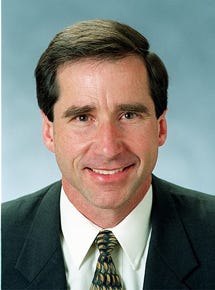MBA Polymers to double recycling capacity, pushes for US reclaim legislation
Orlando—Mike Biddle, founder and president of post-consumer plastics recycler MBA Polymers (Richmond, CA), offered details on his company's plans to double its capacity in the next year, as well as its intention to add recycled polycarbonate (PC) and PC/acrylonitrile butadiene styrene (ABS) blends to its offerings. The company's new facility in Worksop, Nottinghamshire, England will begin operations this year with annual recycling capacity of 60,000 tons/yr, before expanding to 80,000 tons/yr in a year and a half.
March 15, 2010
Orlando—Mike Biddle, founder and president of post-consumer plastics recycler MBA Polymers (Richmond, CA), offered details on his company's plans to double its capacity in the next year, as well as its intention to add recycled polycarbonate (PC) and PC/acrylonitrile butadiene styrene (ABS) blends to its offerings. The company's new facility in Worksop, Nottinghamshire, England will begin operations this year with annual recycling capacity of 60,000 tons/yr, before expanding to 80,000 tons/yr in a year and a half.
Addressing attendees of the Society of Plastics Engineer's (SPE) Global Plastics Environmental Conference (GPEC; March 8-10, Orlando), Biddle described his company's rapid growth since starting in his garage in 1993 to today, with the UK site joining Austrian (Kematen) and Chinese (Guangzhou) facilities that opened in 2006 with respective capacities of 40,000 tons/yr. The English facility will start with a production capacity of 60,000 tons/yr, before expanding to 80,000 tons/yr, and Biddle said a supply agreement announced in January with European Metal Recycling Limited (EMR) of Warrington, England, will provide it with 100% of their scrap feedstock needs.
|
Mike Biddle, founder and CEO of MBA Polymers. |
Biddle told the audience that MBA has recovered more than 100 mm lb of plastic, with sales over the 2008-2009 timeframe—when demand for virgin plastic actually contracted in many instances—actually climbing from 29 to 33 million lb. Over the last two years, Biddle said MBA has sold more than 60 million lb of materials. "We sell a drop-in replacement for virgin," Biddle explained, "that's always been our business model: close the loop."
When recyclers break down discarded goods and pull out metals, glass, and other widely recycled materials, plastics remains as the most prevalent "shredder residue". In electronic shredder residue (ESR), the largest materials by volume are ABS, polystyrene (PS), PP, PC, and PC/ABS. MBA currently offers the first three, with the ability to separate out flame-retardant (FR) and non-FR grades, as well as the ability to distinguish injection grades from extrusion ones. In the UK, it will have a new line of reclaimed PP resin, which can separate filled and unfilled grades.
In his presentation, Biddle said changes to end-of-life scenarios for electronics and automotive waste in the U.S. would allow him to dramatically increase its already expanding sales. At this time in North America, Biddle said there are more than 21 million tons of electronics waste produced annually and 10 billion lb of automotive waste.
"Many people know this is a problem," Biddle said, "we view it as mines: above-ground mines." Earlier this year, Biddle testified before congress on the matter, with some in D.C. understanding that the current options metal recyclers face for left-over plastic waste—send to developing countries, incinerate, or landfill—represent a missed opportunity here in the U.S. "I think we've gotten a lot of traction [in Washington], but there is still no legislation," Biddle said. "The story is obvious—Congress gets it."
In Europe, Waste Electrical and Electronic Equipment (WEEE) regulations mandate proper disposal of items like computers, ensuring a steady stream of plastic waste for his firm. In the U.S., however, collection is more scattershot. To the north, Canada has adopted a WEEE-type program and their volumes are already growing. "If the U.S. adopted WEEE," Biddle said, "we'd build plants as fast as we could."
The company has hired lobbyists to push plastics recycling's cause in D.C. and Brussels, with a particular emphasis on the untapped resource of America. "We have more mines of plastics here in the U.S. than in any other country in the world," Biddle said. —Tony Deligio
About the Author(s)
You May Also Like



